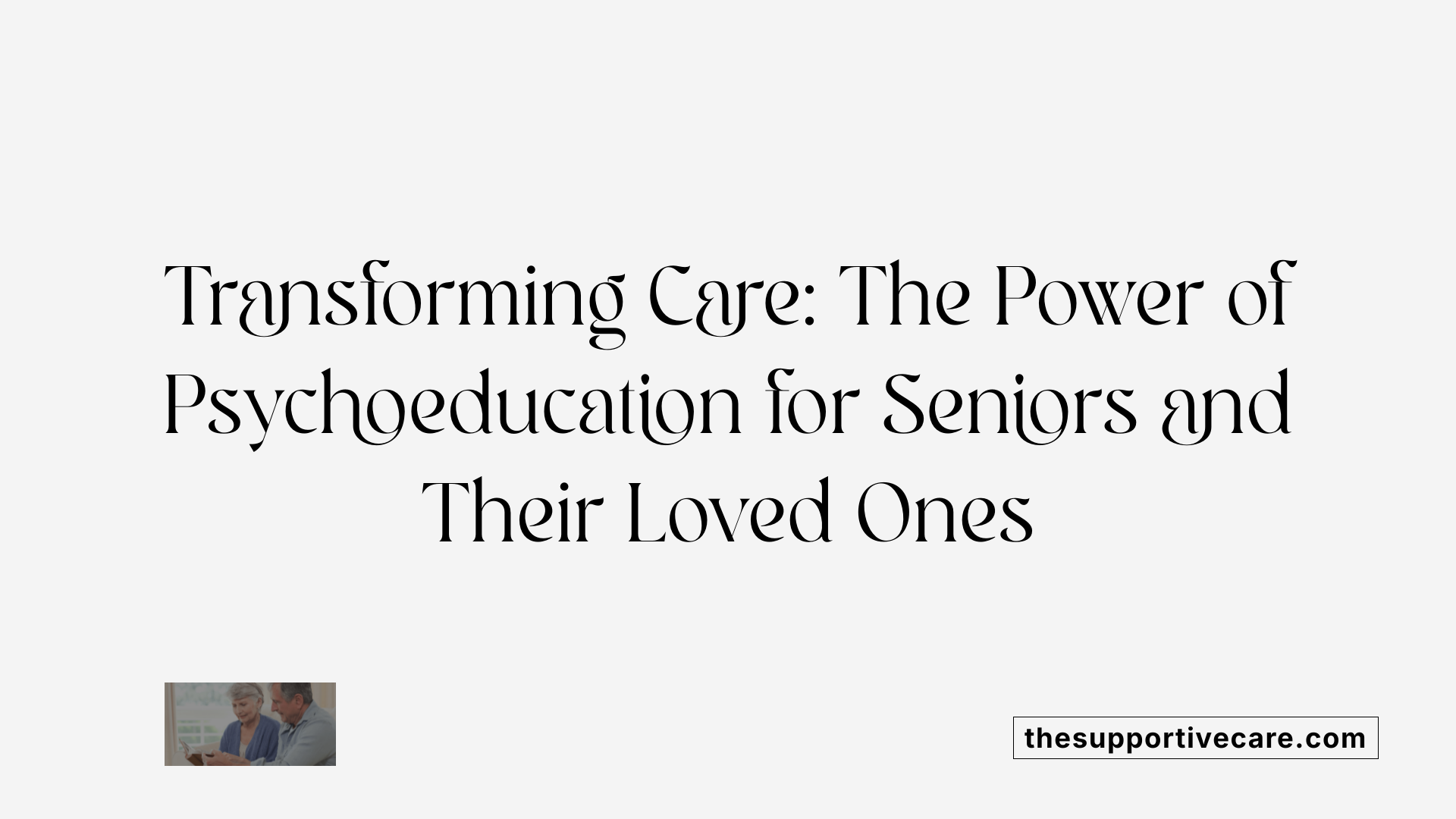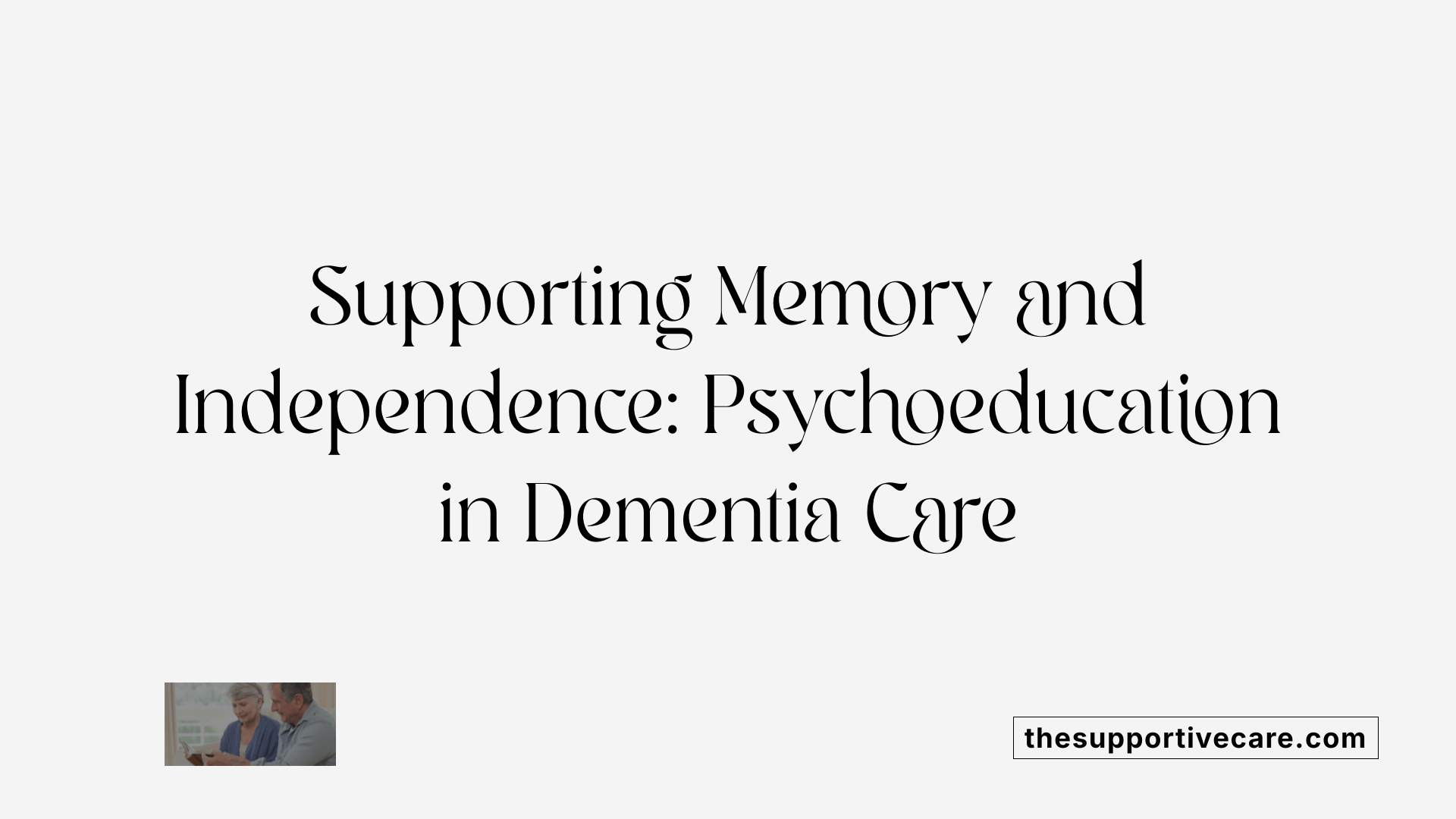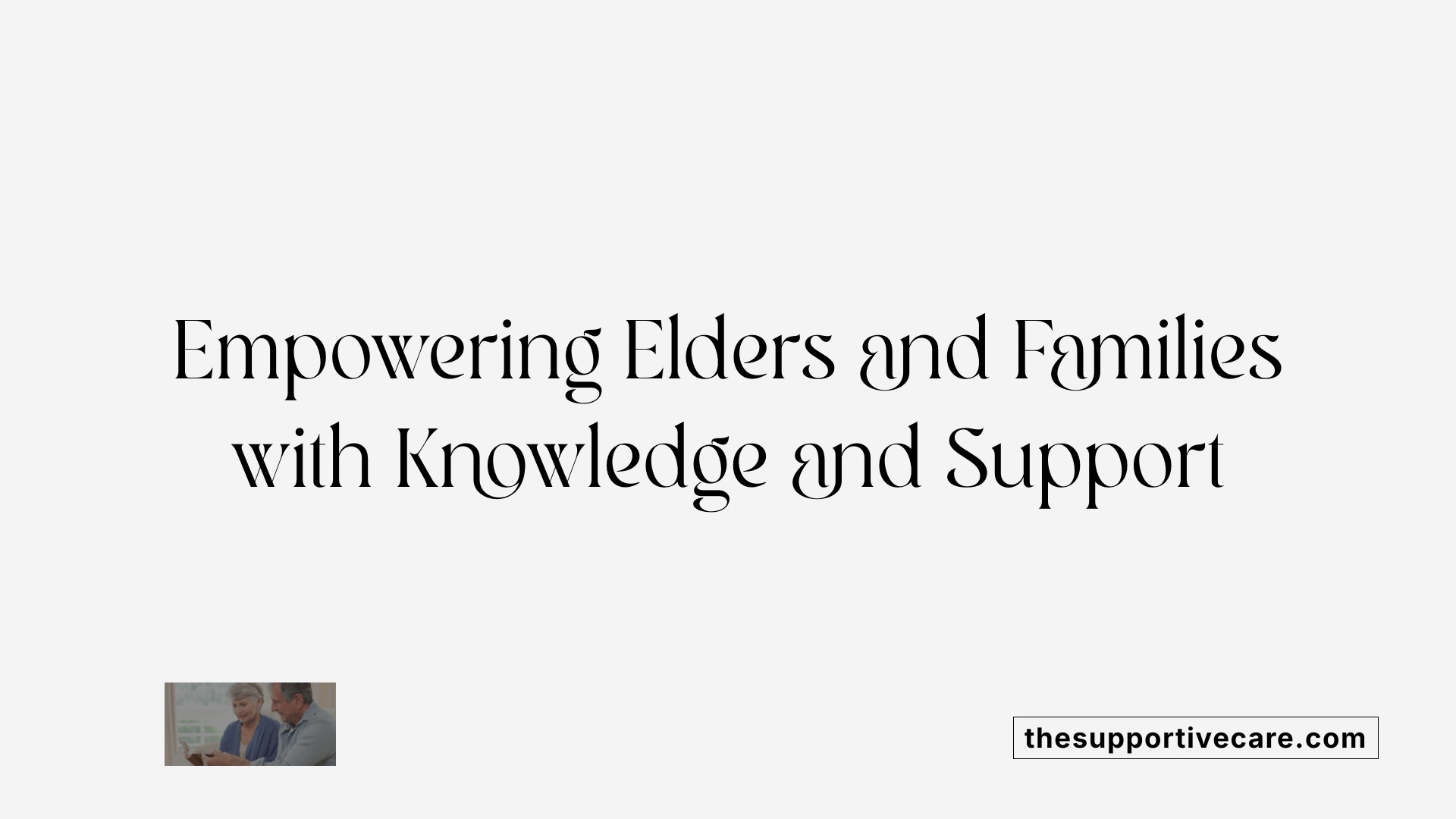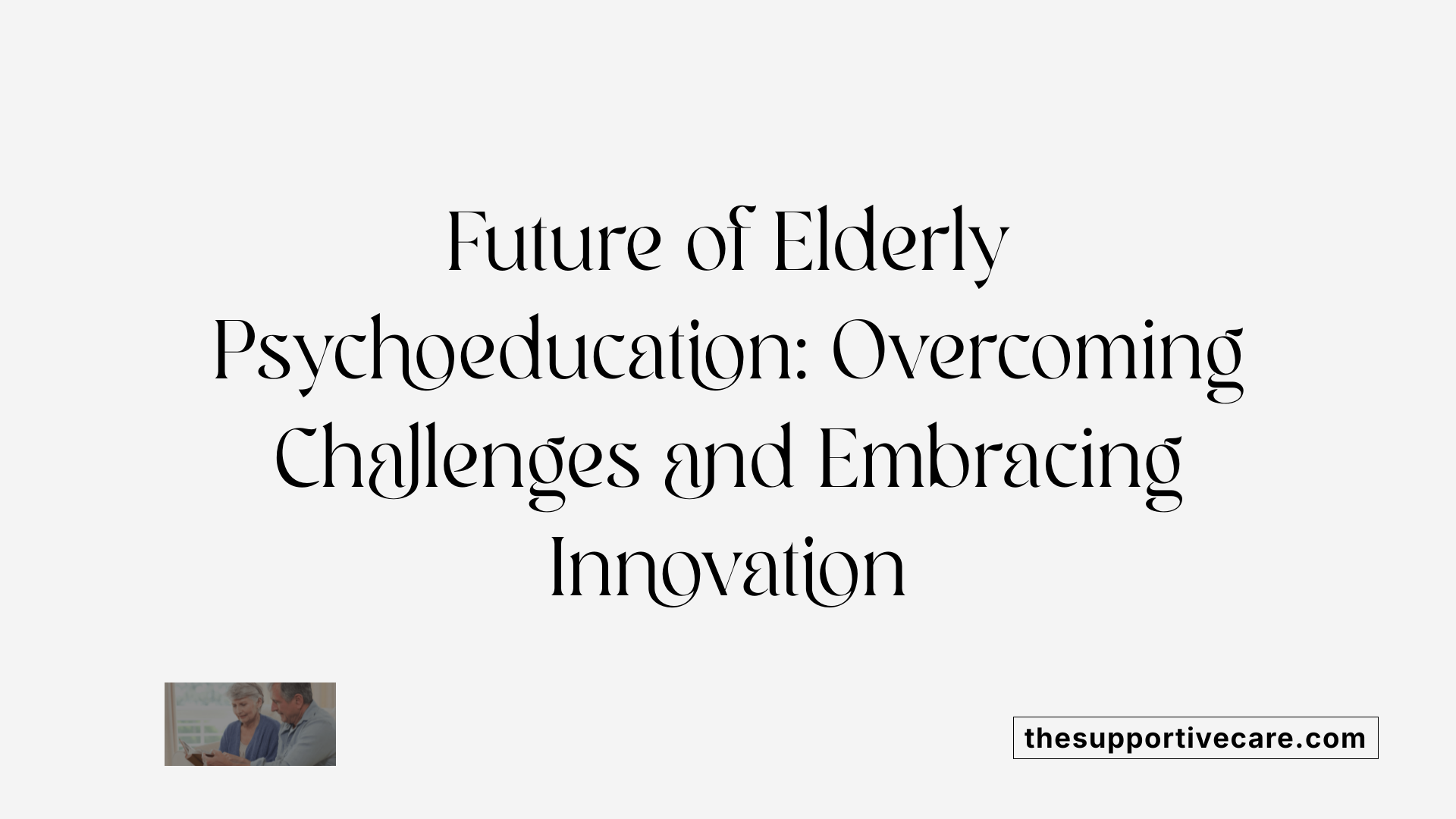Understanding the Transformative Power of Psychoeducation in Geriatric Care
Psychoeducation has emerged as a crucial component in modern elderly care, providing essential knowledge and support tailored to senior patients and their families. Through structured information dissemination, skill development, and emotional support, psychoeducation fosters healthier mental states, better management of chronic and cognitive conditions, and improves overall well-being. This article explores the multifaceted benefits of psychoeducation, highlighting its role in enhancing treatments, supporting caregivers, preventing falls, and managing specific conditions such as dementia and depression.
Fundamentals of Psychoeducation and Its Evolution in Mental Health care
What is psychoeducation?
Psychoeducation is a structured therapeutic approach that involves providing patients, families, and caregivers with vital information about mental health conditions. It covers the causes, symptoms, possible treatment options, and expected progression of various mental illnesses. The main goal is to improve understanding, encourage adherence to treatment plans, and empower individuals to manage their conditions effectively.
Having roots in early efforts to foster mental health awareness, psychoeducation has grown into a core element of many mental health treatments. It plays a vital role in conditions such as schizophrenia, bipolar disorder, depression, and dementia.
How has psychoeducation developed over time?
Initially, psychoeducational programs focused simply on raising awareness about mental health issues. Over the years, the approach has expanded to include skill development in areas like stress management, communication, and relapse prevention.
Modern psychoeducation is evidence-based, often integrated into broader treatment frameworks. It is facilitated by mental health professionals and tailored to meet the needs of diverse populations, including seniors and chronic mental illness sufferers.
What formats does psychoeducation take?
Psychoeducation can be delivered in various formats, tailored to individual and group needs:
| Format | Description | Typical Participants | Benefits |
|---|---|---|---|
| Individual sessions | One-on-one education tailored to patient's specific needs | Patients or caregivers | Personalized attention and flexible pacing |
| Group programs | Interactive sessions with multiple participants sharing experiences | Patients, caregivers, or families | Encourages peer support and shared learning |
| Family psychoeducation | Education combined with support techniques for families | Families of patients | Fosters better communication and support networks |
This diversity in delivery methods increases accessibility and allows programs to be customized for different settings, including clinics, community centers, or online platforms.
Broader impact
Effective psychoeducation enhances treatment adherence, reduces stigma, and improves quality of life for patients and their support systems. For seniors and those with complex mental health needs, tailored psychoeducational interventions can be particularly beneficial, supporting long-term recovery and social engagement.
Research supports the widespread implementation of psychoeducational approaches in mental health services, emphasizing their role in fostering informed, resilient support networks for vulnerable populations.
Psychoeducation's Impact on Elderly Patients and Their Families

What are the benefits of psychoeducation for elderly patients and their families?
Psychoeducation plays a vital role in supporting elderly patients and their families by providing essential information about mental health conditions. It helps them understand the causes, symptoms, and treatment options for mental illnesses common among seniors, such as depression, dementia, and anxiety.
This knowledge empowers families to manage symptoms more effectively and make informed decisions about care and treatment. It also promotes emotional support within families, reducing feelings of isolation and stigma that often accompany mental health issues in older adults.
Group sessions and educational activities create opportunities for sharing experiences and exchanging support, which boosts morale and enhances mental well-being.
For caregivers, psychoeducation improves coping skills, providing strategies like relaxation techniques, problem-solving, and communication skills. This leads to a greater sense of control, reducing stress and caregiver burden.
Overall, psychoeducational interventions support better mental health outcomes, help prevent crises, and improve the quality of life for elderly individuals and their loved ones.
| Benefits | Description | Additional Details |
|---|---|---|
| Increased understanding | Clarifies mental health conditions, treatments, and management strategies. | Enhances decision-making and care planning. |
| Emotional support | Fosters a sense of community and shared experience, reducing stigma and loneliness. | Group sharing boosts morale. |
| Empowerment to caregivers | Equips families with coping strategies and problem-solving skills. | Reduces stress and caregiver burden. |
| Better management of symptoms | Helps in recognizing early signs of relapse or deterioration. | Promotes timely intervention. |
| Improved quality of life | Supports mental health stability and emotional well-being. | Enhances social engagement and daily functioning. |
Research shows that psychoeducation not only equips families with important knowledge but also fosters a supportive environment, which is critical for improving mental health in elderly individuals. Its wide-reaching benefits make it a valuable component of comprehensive elder care.
Supporting Seniors with Cognitive Decline and Dementia

How does psychoeducation support seniors with cognitive decline or dementia and their families?
Psychoeducation plays a vital role in supporting both elderly individuals with cognitive decline or dementia and their families. It increases their understanding of the disease, helping families recognize symptoms and learn about disease progression. This knowledge promotes awareness of modifiable risk factors such as lifestyle changes and health management.
Educational strategies include providing information on behavioral and psychological symptoms, which can often be managed with tailored coping techniques. These strategies include cognitive-behavioral approaches, mindfulness practices, and practical tools that help manage mood swings, agitation, and memory lapses.
Involving families is crucial, as psychoeducation encourages participation in reminiscence activities, life story work, and cognitive stimulation exercises. These activities support social engagement, boost self-esteem, and maintain independence for as long as possible.
Low-cost, accessible interventions are especially important during circumstances like the COVID-19 pandemic, where in-person visits might be limited. Online platforms, mobile applications, and telehealth services have proven effective in delivering psychoeducational content.
Overall, psychoeducation helps foster disease acceptance, reduces caregiver stress, and supports early intervention. By empowering families with this knowledge and skills, it enhances the quality of care, promotes emotional well-being, and helps maintain a positive outlook despite the challenges of cognitive decline.
Reducing Caregiver Burden Through Psychoeducational Support
Psychoeducational interventions are vital in helping caregivers manage the stresses associated with caring for loved ones with chronic illnesses, especially dementia and Alzheimer's disease. These programs provide caregivers with essential information about the illness, caregiving strategies, and available resources, which can significantly lessen their feelings of burden.
A core component of effective psychoeducation is skills training in areas like problem-solving, stress management, and communication. These skills enable caregivers to handle daily challenges more effectively, reducing emotional and physical exhaustion. For example, relaxation techniques and mindfulness exercises help manage anxiety and promote emotional resilience.
Group formats facilitated by trained mental health professionals are particularly beneficial. They not only deliver valuable information but also foster peer support, allowing caregivers to share shared experiences and learn from others facing similar challenges. This sense of community can reduce feelings of isolation and promote a more optimistic outlook.
Research indicates that psychoeducational programs positively impact various strains caregivers experience.
| Strain Type | Effects of Psychoeducation | Details |
|---|---|---|
| Physical | Reduced exhaustion and better health maintenance | Caregivers feel more capable of managing physical demands |
| Emotional | Lower anxiety and depression levels | Support and skills reduce feelings of helplessness |
| Social | Enhanced social interactions and support networks | Peer group settings encourage sharing and mutual support |
| Financial | Better understanding of care costs and resource management | Education on available services helps optimize resource use |
While psychoeducational approaches show robust benefits in alleviating caregiver stress, the impact on mental health symptoms such as depression is less clear. Nonetheless, the overall improvement in caregivers’ quality of life and capacity to provide care underscores the importance of these interventions.
In summary, combining educational content, skills training, and peer support within group settings offers a comprehensive approach to reducing caregiver burden. As a result, caregivers experience less stress, improved well-being, and a greater ability to provide compassionate, effective care.
Evidence Supporting Psycheducational Interventions in Elderly Care
What evidence supports the effectiveness of psychoeducation in elderly care?
Research and clinical trials consistently demonstrate that psychoeducational programs significantly improve outcomes for older adults and their caregivers. These interventions help manage mental health conditions such as depression, dementia, and anxiety, as well as chronic physical illnesses like hypertension and diabetes.
Studies show that psychoeducation reduces caregiver burden by equipping family members and caregivers with essential knowledge, coping skills, and self-efficacy. For example, caregivers caring for individuals with Alzheimer’s disease report fewer feelings of stress and greater confidence in managing daily challenges after participating in psychoeducational activities.
The benefits extend beyond individual health. When families, friends, and community resources are involved, these programs foster social support, which is crucial in elderly care. Knowledge about disease progression, care strategies, and health maintenance promotes better adherence to treatment plans and healthier aging.
Innovative approaches, including low-cost, technology-assisted methods like online modules, telehealth sessions, and mobile applications, have expanded access, especially during pandemic restrictions. These remote delivery methods have proven effective, offering flexible, scalable, and cost-efficient options for broad implementation.
Overall, the accumulated evidence underscores psychoeducation as a vital component in improving health management, reducing caregiver stress, and enhancing quality of life for the elderly. Continued research supports its role as an accessible and adaptable intervention in geriatric healthcare.
Psychoeducation for Managing Specific Conditions in Senior Care
How is psychoeducation implemented in managing specific conditions such as depression, Alzheimer's, and cancer among seniors?
Psychoeducation tailored to seniors with specific health conditions involves creating specialized programs that address their unique needs. These programs typically include detailed information about the illness, coping mechanisms, and practical strategies for managing symptoms.
For depression, interventions often incorporate approaches like Cognitive Behavioral Therapy (CBT), Interpersonal Psychotherapy (IPT), reminiscence therapy, and problem-solving techniques. These methods aim to improve emotional well-being, bolster social connections, and restore self-esteem. Family members and community groups are actively involved to support the patient’s mental health.
In cases of Alzheimer's disease and other dementias, psychoeducational efforts focus on increasing caregiver knowledge about disease progression, behavioral management, and using cognitive stimulation activities. Supervised use of technological tools—such as online platforms, virtual assistants, or robotic companions—helps maintain engagement and enhance the quality of life for seniors.
For seniors battling cancer or chronic illnesses, psychoeducation emphasizes symptom management, stress reduction, and maintaining daily routines. It includes instruction on addressing side effects of treatment, managing pain, and using psychosocial strategies to cope with emotional distress.
Implementing these supportive programs over an extended period allows for continuous adaptation to the evolving needs of seniors. Incorporating family and community involvement ensures a supportive environment that enhances treatment adherence and emotional resilience.
Moreover, innovative techniques—such as digital health tools, telehealth platforms, and AI-assisted learning—are increasingly used to reach more seniors efficiently. These tools help deliver personalized education and support, making elderly care more effective and accessible.
Enhancing Knowledge and Emotional Support Through Psychoeducation

How does psychoeducation enhance knowledge and emotional support for senior patients and their families?
Psychoeducation plays a vital role in providing senior patients and their families with a comprehensive understanding of mental health conditions. By offering clear information about symptoms, causes, and treatment options, it helps reduce confusion and uncertainty, which are common sources of anxiety among older adults. This educational approach fosters better understanding, allowing families to recognize early signs of relapse or worsening conditions, and to manage them appropriately.
Beyond informational support, psychoeducation also targets emotional well-being. It encourages open discussions about feelings such as frustration, grief, or anger, which often accompany aging and mental health challenges. Families learn supportive techniques and coping strategies, including stress management, problem-solving, and relaxation methods, to navigate emotional responses more effectively.
Building resilience and hope is another cornerstone of psychoeducation. Through motivational talks and success stories, it helps instill a sense of possibility for recovery and improved quality of life. Families gain confidence in their ability to support their loved ones, strengthening their emotional bonds and fostering a sense of shared purpose.
Additionally, targeted psychoeducational programs promote long-term treatment adherence by emphasizing the importance of ongoing care and medication management. Empowered with knowledge and supported emotionally, seniors and their caregivers are more likely to follow treatment plans diligently, which enhances health outcomes.
Overall, psychoeducation acts as a bridge between medical management and emotional resilience. It creates a supportive environment where families can better understand the complexities of mental illness, process their emotional reactions, and develop a hopeful outlook for the future.
Current Challenges and Future Directions in Elderly Psychoeducation
 Implementing psychoeducational programs for elderly patients and their caregivers involves several best practices to maximize effectiveness and sustainability.
Implementing psychoeducational programs for elderly patients and their caregivers involves several best practices to maximize effectiveness and sustainability.
One of the primary strategies is tailoring the content to meet the unique needs of older adults. This includes considering cognitive, sensory, and cultural factors that influence learning and engagement. Tailored content ensures that information is relevant and comprehensible, encouraging active participation.
Engaging all stakeholders—from patients and families to healthcare providers and community organizations—is crucial. Their involvement helps in designing programs that are aligned with real-world needs and fosters a sense of ownership, which supports ongoing participation.
Securing support from healthcare organizations and developing strong policy backing are vital for resource allocation and program longevity. Structuring programs with a multidisciplinary team—including clinicians, psychologists, social workers, and peer facilitators—can enhance credibility and relatability, providing comprehensive support.
Addressing systemic barriers such as limited resources, inadequate referral pathways, and access issues remains a challenge. Leadership within healthcare institutions and dedicated program champions can drive strategic planning and resource mobilization.
Involving service users and their families in the development process helps ensure the program's relevance and acceptance. This participatory approach can improve engagement and adherence.
Innovative delivery methods, including digital platforms, multimedia resources, and flexible scheduling, can significantly improve accessibility for elderly participants, especially those in remote or underserved areas. Group sessions, online modules, and telehealth options allow for broad outreach and adaptability.
Overall, successful implementation depends on a combination of customized content, stakeholder collaboration, organizational support, and ongoing evaluation. Regular feedback and data-driven improvements ensure these programs evolve to meet the changing needs of the elderly population and their caregivers.
In summary, integrating these best practices creates a robust framework that can overcome existing barriers and expand the reach and impact of psychoeducation in elderly mental health care.
Towards a Healthier, Informed Aging Population
Psychoeducation stands as a cornerstone in fostering healthier, more resilient aging populations. Its multifaceted benefits—ranging from improved understanding of mental health conditions and enhanced caregiving skills to fall prevention and proactive management of chronic diseases—highlight the importance of integrating these programs into routine elder care. As research continues to validate its effectiveness and innovative delivery methods expand reach, psychoeducation promises a future where seniors and their families are better equipped, supported, and empowered. Embracing these strategies can significantly improve the quality of life, promote dignity, and support the aging process with compassion and knowledge.
References
- The Benefits of Psychoeducation | Canyon Creek Behavioral Health
- Effects of a psychoeducational intervention in family caregivers of ...
- The Importance of Family Psychoeducation | Walden University
- The role of psychoeducation and yoga in reducing ... - ProBiologists
- Can older “at risk” adults benefit from psychoeducation targeting ...
- Effects of the family support and psychoeducation program based on ...
- Support based on psychoeducation intervention to address quality ...



































































































